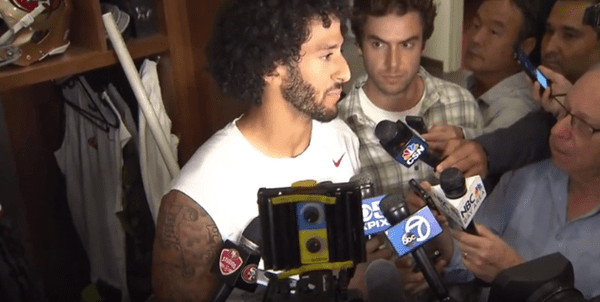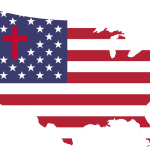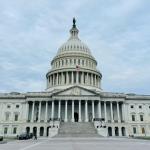 San Francisco quarterback Colin Kaepernick refused to stand while the National Anthem played on Friday night. He plans to continue his protest into the season. He defended his decision over the weekend, stating that, “This country stands for freedom, liberty, justice for all – and it’s not happening right now.”
San Francisco quarterback Colin Kaepernick refused to stand while the National Anthem played on Friday night. He plans to continue his protest into the season. He defended his decision over the weekend, stating that, “This country stands for freedom, liberty, justice for all – and it’s not happening right now.”
By sitting down, Kaepernick is standing up for those people who remain voiceless. “There’s people being murdered unjustly and not being held accountable. Cops are getting paid leave for killing people. That’s not right.”
Kapernick’s protest comes during a month where black men like Philando Castile and Sylville Smith have been murdered by police officers. Just this weekend, the Associate Press reports that, “After threatening to sue, the Chicago Tribune has obtained data from the city’s police department that tracks every time an officer has opened fire in the city over the past six years. The vast majority of those hit were black men or boys.”
Racism in America
Racism remains a huge problem in America. Jim Wallis describes the problem well in his recent book on racism, America’s Original Sin,
Too many African Americans have been left behind without good education, jobs, homes, and families—and these factors are all connected. Perhaps most visibly and dramatically, the treatment of black men by police and a still racialized criminal justice system in America became painful and controversial national issues over the last few years, making visible what has been true for decades.
Of course, these facts have been invisible to white Americans, not the many black Americans who live with a system of oppression every day. And now Kaepernick has placed that racism front and center.
The truth will set you free. But the truth about racism that Kaepernick has set before us is making many white Americans uncomfortable. Instead of suffering from white fragility and defensiveness, we would do well to listen to Kaepernick’s reasons for protesting.
Unfortunately, many fans are not listening. In a classic case of white fragility that blinds us to the truth, they attack Kaepernick. In fact, the Twitterverse relentlessly criticized him. Some burned Kaepernick jerseys, while others criticized him for being anti-American. Others assert that the 49ers should release him.
Kaepernick doesn’t seem to care about the consequence. After sitting down during the Anthem, he told NFL.com, “I am not looking for approval. I have to stand up for people that are oppressed … If they take football away, my endorsements from me, I know that I stood up for what’s right.”
Many, including the 49ers organization, have defended Kapernick’s right to sit during the anthem. The team’s leadership commented, “In respecting such American principles as freedom of religion and freedom of expression, we recognize the right of an individual to choose to participate, or not, in our celebration of the national anthem.”
Kaepernick’s supporters have generally followed the 49ers lead. As an American, the argument goes, he has the freedom to protest. Some say this with resentment, as in, “He has the freedom to act like an idiot.” But I’d like to explore a different motivation that has little to do with American “freedom” – Kaepernick’s Christian faith.
Because, you see, America and Christianity are not the same thing. For many Evangelicals, if you criticize America, you are criticizing Christianity.
Since coming into the NFL, Kaepernick has spoken about his faith.* He also has Bible verses tattooed on his chest and a cross on his arm. But his expressions of faith are more than skin deep. Kaepernick is standing up with those cast to the margins of society by a culture that continues to foster systemic racism. In doing so, he is using his platform to worship the God who stands with the marginalized in order to transform human culture.
Christianity – A Protest Movement
When Jesus announced the Kingdom of God was at hand, he was implicitly protesting the Kingdom of Rome. He became one with the oppressed, speaking with and for them. Jesus challenged the national and religious power structures of his day, and those power structures killed him as a result.
The Roman empire gained strength through violence. Like a black man living in America, Jesus was arrested and killed by state soldiers and police. As the Gospel of John tells it, “… a detachment of soldiers together with police from the chief priests and the Pharisees” came to arrest Jesus “with lanterns and torches and weapons.”
Jesus protested Roman oppression in order to show Rome an alternative way of living. The way of love and justice. And he suffered the consequences.
After his death, the early Christians continued as a protest movement that hoped for social transformation. “Jesus is Lord,” they proclaimed, which meant Caesar and the Roman Empire were not. They refused to worship the Roman gods of conquest that oppressed those on the margins. They risked their lives by declining to participate in public displays of national loyalty that required people to offer sacrifices to Caesar. The early Christians protested. They sat down.
One can argue whether Kaepernick is being a loyal America by refusing to stand during the National Anthem. But in standing up against racism that continues to oppress black people in this country, he is following Jesus. And like Jesus, he is suffering the consequences.
Kaepernick is showing us that for Christians, Jesus is Lord. Which means that America is not.
*I’m aware of gossip websites that claim Kaepernick is being “anti-American” because he converted to Islam two months ago. This false connection shows that not only is racism a problem in America, but so is Islamophobia. Whatever the case, Christianity and Islam have long histories of protesting cultural oppression. As a Christian, I pray for the day when Christians are criticized for being “anti-American” when standing up with the oppressed.
Image: Screenshot from YouTube: NBC News, Colin Kaepernick: I’ll continue to sit for National Anthem















